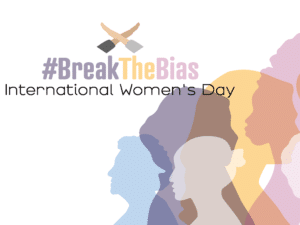Self-employment can be an appealing career path; the flexibility to […]
 This years’ International Women’s Day challenges us all to Break the Bias by imagining a “world free of bias, stereotypes and discrimination. A world that's diverse, equitable, and inclusive. A world where difference is valued and celebrated”. Companies are doing many things to help negate bias. With a bid to incorporate full inclusivity of genders, sexes, races, sexualities and those with health conditions or impairments into all industries and career levels, a key method has been to implement anonymous job applications.
This years’ International Women’s Day challenges us all to Break the Bias by imagining a “world free of bias, stereotypes and discrimination. A world that's diverse, equitable, and inclusive. A world where difference is valued and celebrated”. Companies are doing many things to help negate bias. With a bid to incorporate full inclusivity of genders, sexes, races, sexualities and those with health conditions or impairments into all industries and career levels, a key method has been to implement anonymous job applications.
Anonymous job applications are gaining significant traction in today’s recruitment market. They look to avoid relying on CVs to recruit, as these are often full of information that can be deemed as specific to socio-cultural groups. Even when going through Applicant Tracking Systems, which tend to be keyword-driven, issues have arisen that have promoted exclusivity within recruitment streams. The example of Amazon’s recruitment AI is now well known. Amazon trained their system to evaluate applicants by observing patterns in CVs submitted over a 10-year period. Due to the reflection of male dominance across the tech industry, the AI taught itself that male candidates were preferable, penalising CVs that included the word ‘women’ and neglecting graduates of all-women’s groups and schools.
The solution to provide a more inclusive recruitment system had led to the use of anonymous applications. These seek to remove any identifiable data from the application, giving no insight into someone’s age, gender, ethnicity, socio-economic standing, education, or even past professional experience. Here are some types of anonymous application tools you might come across as a job seeker:
Some companies will provide an initial ‘blind’ application form that removes details such as race, nationality, gender and age – all factors that can lead to biased decisions. The focus of the application isn’t based on employment history or academic credentials, but 3 or 4 questions asking about reasons for applying, their view of an industry challenge or an approach to a problem that provides insight into how the applicant might tackle the task. Often, this type of anonymous introduction will lead to an invite to a more through application or interview. This can also eliminate bias created through educational and ethnic background, as well as age and gender.
Structured interviews create a fairer process too. Having the same list of interview questions will ensure candidates will be benchmarked against the same criteria. More companies introduce panel interviews with a diverse set of colleagues (in terms of gender, ethnicity, age, etc.) to ensure any personal unconscious biases are removed and to gain a wider perspective resulting in a more informed hiring decision.
The concept of completing a game as part of the recruitment process is becoming more popular, particularly as Gen Z approaches the job market. By asking applicants to anonymously complete a puzzle or level is a good way to challenge skills without requiring any identifying information. This is particularly important within the traditionally male-orientated STEM industries. Gamification is also a great way to identify more relevant applications from people across multiple backgrounds, as playing a game requires effort and commitment, forcing the applicant to stop and think whether it’s worth their time. It’s also useful for challenging experience bias: If evaluating candidates based on their recent experience, then you might be excluding those making a career change. These people may have different experience, but they might also possess transferable skills and the ability to adapt. Games give them the chance to showcase their actual competencies.
A new software that is available is the AI-led interview. This completely eradicates the need for a human interviewer. One company that is championing the use of this technology is Predictive Hire, who clarify that it taps “into a wider pool of talent and gives everyone a fair and equal chance of success through a fast and easy chat interview”. Such a platform, as well as ensuring no human-led bias can occur during a more traditional face-to-face model, means that the applicant can have more control on where and when to have the interview as the system allows candidates to complete their video interview anywhere, anytime, on any device.
Although at some level all of these new technologies will reply on human interaction to make final recruitment choices, it’s worth every job seeker being prepared to interact with these new platforms as recruitment becomes as non-biased and as inclusive as possible.
Renovo is the UK’s leading outplacement specialist. We work with both organisations and individuals to support all their career transition requirements. If you would like to understand how Renovo can help you please call 0800 612 2011 or email info@renovo.co.uk
Self-employment can be an appealing career path; the flexibility to […]
Spring is considered to be the season of new beginnings […]
Artificial Intelligence (AI) Chat Bots are evolving in the modern […]